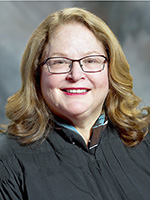Chief Justice Mary E. Fairhurst
2019 American Inns of Court Professionalism Award for the Ninth Circuit
By Rebecca A. Clay
 Back when Mary E. Fairhurst was serving as a clerk to the chief justice of the Washington State Supreme Court, she never imagined that 31 years later she would be the court’s chief justice.
Back when Mary E. Fairhurst was serving as a clerk to the chief justice of the Washington State Supreme Court, she never imagined that 31 years later she would be the court’s chief justice.
“When I told the chief justice I was leaving, he said, ‘Don’t you want to be my law clerk forever?’” remembers Fairhurst. “I said, ‘I want to be a justice one day, so I have to be a lawyer.’” But becoming a supreme court justice seemed unlikely, given that there are only nine positions and thousands of lawyers in the state.
That dream became a reality in 2002, when Fairhurst became a Washington State Supreme Court justice. In 2017, her colleagues selected her to become the court’s chief justice. She stepped down on January 5 after learning that her colon cancer—first diagnosed in 2008—had spread.
Fairhurst was not always so gung-ho about the law. As a child, her parents and everyone around her told her she should be a lawyer. “I was very good at explaining positions, defending people, and standing up for things I thought were unjust,” she laughs. “But I didn’t know any lawyers or judges, so I didn’t know very much about it.” Instead, she thought of becoming a creative writer or perhaps a psychologist or psychiatrist.
But after studying political science at Gonzaga University in Spokane, where she graduated cum laude in 1979, she entered law school at the advice of a mentor who urged her to consider public service. She told herself she could drop out any time, but ended up loving it, graduating magna cum laude from Gonzaga University School of Law in 1984.
After two years of clerking at the Washington State Supreme Court, Fairhurst left to join the state’s office of the attorney general, where she spent 16 years. During that time, she got involved with Washington Women Lawyers, eventually becoming president. She later became the first public sector attorney and second woman to become president of the Washington State Bar Association.
When a position on the state’s Supreme Court opened up, Fairhurst—at the urging of family, friends, and colleagues—went for it. One of her proudest moments as a justice, she says, was when the court deemed the state’s death penalty unconstitutional and abolished it in 2018.
Fairhurst also helped improve Washingtonians’ lives with work unrelated to her cases. She pushed for a constitutional amendment to increase crime victims’ rights while protecting the accuseds’ constitutional rights. She helped organize the state’s first conferences on domestic violence. She also helped organize a summit on youth violence and moderated conferences on how to deal with sex offenders in the community.
Fairhurst has been especially active in civics education programs for young people, including iCivics, We the People, and the YMCA’s Youth and Government Program. Such initiatives can help young people understand their rights as well as the roles of the Constitution, the rule of law, and an independent judiciary—knowledge that was lost when schools stopped requiring civics or government classes, Fairhurst says. “It’s really important that in whatever ways we can, we help young people—the future voters and decision-makers in our country—understand the role of government, especially the role of the judiciary,” she says. “It’s very easy for people…to give up rights or not even understand they have them.”
One theme has dominated Fairhurst’s career, says Jessica Skelton, Esquire, who clerked for Fairhurst and is now a partner at Seattle’s Pacifica Law Group. “Ensuring access to justice has long been Mary’s calling,” says Skelton, who nominated Fairhurst for the award. Even in her last months as a judge, for instance, Fairhurst was meeting with representatives of the U.S. Department of Homeland Security and other agencies to try to persuade them to designate courthouses as “sensitive locations” where immigration enforcement activities are prohibited. “When people are afraid to appear for court hearings, out of fear of apprehension by immigration officials, their ability to access justice is compromised,” she wrote to the Secretary of Homeland Security in 2017.
With her life expectancy predicted to be less than two years, Fairhurst now hopes to focus on exercise and travel. “If I don’t have the energy to do that, I’ll just be at home with my family and make more memories,” says the Olympia resident, whose family includes a “sweetheart,” his adult children, her six siblings and their children, dozens of cousins, her law clerks and their children, and many, many friends.